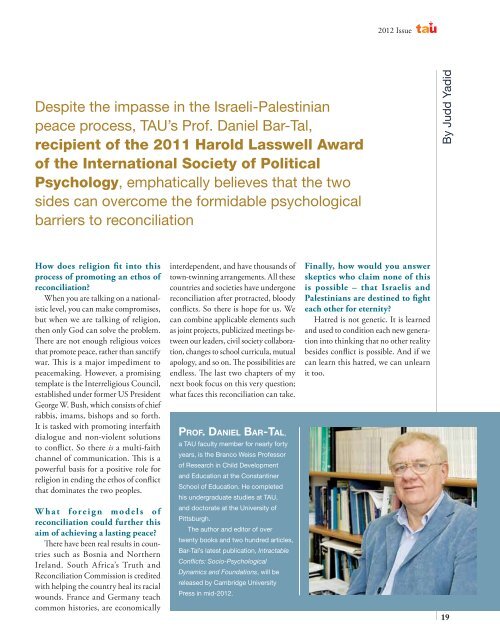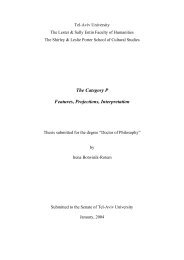Personalized Medicine “It doesn't get more personal than this.â€
Personalized Medicine “It doesn't get more personal than this.â€
Personalized Medicine “It doesn't get more personal than this.â€
You also want an ePaper? Increase the reach of your titles
YUMPU automatically turns print PDFs into web optimized ePapers that Google loves.
Despite the impasse in the Israeli-Palestinian<br />
peace process, TAU’s Prof. Daniel Bar-Tal,<br />
recipient of the 2011 Harold Lasswell Award<br />
of the International Society of Political<br />
Psychology, emphatically believes that the two<br />
sides can overcome the formidable psychological<br />
barriers to reconciliation<br />
How does religion fit into <strong>this</strong><br />
process of promoting an ethos of<br />
reconciliation?<br />
When you are talking on a nationalistic<br />
level, you can make compromises,<br />
but when we are talking of religion,<br />
then only God can solve the problem.<br />
There are not enough religious voices<br />
that promote peace, rather <strong>than</strong> sanctify<br />
war. This is a major impediment to<br />
peacemaking. However, a promising<br />
template is the Interreligious Council,<br />
established under former US President<br />
George W. Bush, which consists of chief<br />
rabbis, imams, bishops and so forth.<br />
It is tasked with promoting interfaith<br />
dialogue and non-violent solutions<br />
to conflict. So there is a multi-faith<br />
channel of communication. This is a<br />
powerful basis for a positive role for<br />
religion in ending the ethos of conflict<br />
that dominates the two peoples.<br />
What foreign models of<br />
reconciliation could further <strong>this</strong><br />
aim of achieving a lasting peace?<br />
There have been real results in countries<br />
such as Bosnia and Northern<br />
Ireland. South Africa’s Truth and<br />
Reconciliation Commission is credited<br />
with helping the country heal its racial<br />
wounds. France and Germany teach<br />
common histories, are economically<br />
interdependent, and have thousands of<br />
town-twinning arrangements. All these<br />
countries and societies have undergone<br />
reconciliation after protracted, bloody<br />
conflicts. So there is hope for us. We<br />
can combine applicable elements such<br />
as joint projects, publicized meetings between<br />
our leaders, civil society collaboration,<br />
changes to school curricula, mutual<br />
apology, and so on. The possibilities are<br />
endless. The last two chapters of my<br />
next book focus on <strong>this</strong> very question;<br />
what faces <strong>this</strong> reconciliation can take.<br />
prof. DanieL Bar-taL,<br />
a TAU faculty member for nearly forty<br />
years, is the Branco Weiss Professor<br />
of Research in Child Development<br />
and Education at the Constantiner<br />
School of Education. He completed<br />
his undergraduate studies at TAU,<br />
and doctorate at the University of<br />
Pittsburgh.<br />
The author and editor of over<br />
twenty books and two hundred articles,<br />
Bar-Tal’s latest publication, Intractable<br />
Conflicts: Socio-Psychological<br />
Dynamics and Foundations, will be<br />
released by Cambridge University<br />
Press in mid-2012.<br />
2012 Issue<br />
TEL AVIV UNIVERSITY REVIEW<br />
Finally, how would you answer<br />
skeptics who claim none of <strong>this</strong><br />
is possible – that Israelis and<br />
Palestinians are destined to fight<br />
each other for eternity?<br />
Hatred is not genetic. It is learned<br />
and used to condition each new generation<br />
into thinking that no other reality<br />
besides conflict is possible. And if we<br />
can learn <strong>this</strong> hatred, we can unlearn<br />
it too.<br />
By Judd Yadid<br />
19

















